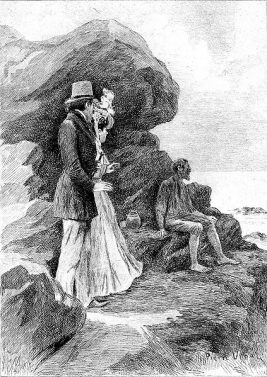
A Drama on the Seashore
THE HUMAN COMEDY – Honoré de Balzac XVth volume of works of Honoré de Balzac edited by widow André Houssiaux, publisher, Hebert and Co, successors, 7 rue Perronet – Paris (1874)
Philosophical studies 
A DRAMA ON THE SEASHORE (1834)
Work dedicated by Honoré de Balzac TO MADAME LA PRINCESSE CAROLINE GALLITZIN DE GENTHOD, NEE COUNTESS WALEWSKA Tribute and remembrance of the author.
Analysis of the work This short story appeared in 1835 in the first edition of Etudes philosophiques in 5 volumes in-12°. It has the same meaning asEl Verdugo: it shows how powerful certain social ideas can be. Balzac had Félix Davin sum it up as follows: “Do you see him, this sinister penitent, sitting motionless on his rock? Well, here again, the idea has taken its toll! Fatherhood in turn has become a killer. This penitent is a father who drowned his son because he suspected in him instincts that society rejects, and became a murderer so that his son would not become one.” Mr. Moïse Le Yaouanc pointed out that Félix Davin had himself dealt with this subject in two short stories, Une exécution en famille (A Family Execution ), published in 1832, and Le Père juge et bourreau (The Father as Judge and Executioner ), published in 1834. He believes that Balzac may have chosen this theme as one of the illustrations for his Etudes philosophiques. The introduction recounts a trip Balzac made in June 1830 with Mme de Berny. They sailed down the Loire and ended with an excursion to Le Croisic and Guérande. This walk, which appears to be faithfully recounted at the beginning of the story, gave Balzac the opportunity to describe maritime landscapes of which he was particularly proud.
The Story This is a short story about a couple’s amorous retreat to the banks of the Loire. The lovebirds explore the Loire countryside and marvel at everything. In the course of their wanderings, Louis and Pauline met a poor fisherman in rags, whose misery was a sight to behold. Pitied by such destitution, they decide to buy his catch of a superb lobster and a spider crab. Although the proceeds from this catch amounted to 35 sous, the couple, moved and compassionate, raised the bid to 150 francs. They offer their new friend a guide to the village of Batz. Along the way, they meet a mysterious man called the Wish Man, who seems to frighten the locals. Curious, our couple ask the fisherman to tell them the story of this strange man. Pierre Cambremer, eldest son in a long line of sailors from father to son, married Jacquette Brouin and had a son. An only child, adored by his parents, the little Cambremer, seeing that everything was allowed to him, became naughty. By the age of 16, Jacques Cambremer’s wickedness and perversity had turned him into a shark. Enjoying all the pleasures of life, he began by stealing from his mother, and then went on to steal everything in the family home. Wanted by the law for his many misdemeanors, Pierre Cambremer tried to bring his son to his senses by forcing him to return home. It was all a waste. Invested with evil intentions and the need to do wrong, Jacques continues to rob his parents. He manages to steal the last gold coin his mother has sewn into the mattress of his bed to go and play billiards. The father manages to get his coin back from the owner of the amusement arcade. Following this latest offence, offended, scorned and pushed to the limit by this despotic son, the father decides to take justice into his own hands. When Jacques returns, he informs him of the play’s disappearance and asks Jacques if he is the author. The child denies everything and hurls insults at his poor mother. The father manages to confuse his son with a mark made on the gold coin by the mother. The son, certain that his father will take no action against him, persists in his refusal to accept the truth and falls asleep. The father took advantage of his sleep to bandage his mouth, bind his hands and feet and weight down a rope around his neck. He put her son in the fishing boat, and drowned him at sea despite the poor mother’s pleas. Jacquette died of grief and pain eight days later. Back at their hotel, Louis and Pauline noticed a billiard table in the lower room. When they learned that this was the only public billiard table in Le Croisic, they hurried to make their preparations for departure during the night. Cruelly tormented by the visions of these three lives, Louis, on Pauline’s advice, decides to write this adventure to his uncle. The short story was written by the author in Paris, on November 20, 1834.
The characters Cambremer: Fisherman in Croisic, married Jacquette Brouin, father of son Jacques. Cambremer had a brother, Joseph, himself the father of Pierrette or Pérotte. Jaquette Brouin: Pierre Cambremer’s wife.
Sources: 1) Preface to La Comédie Humaine (tome XXIV) in full, published in 1987 by France-Loisirs, under the auspices of the Société des Amis d’Honoré de Balzac 2) Genealogy of characters: Félicien Marceau “Balzac et son monde” Gallimard.
No Comments